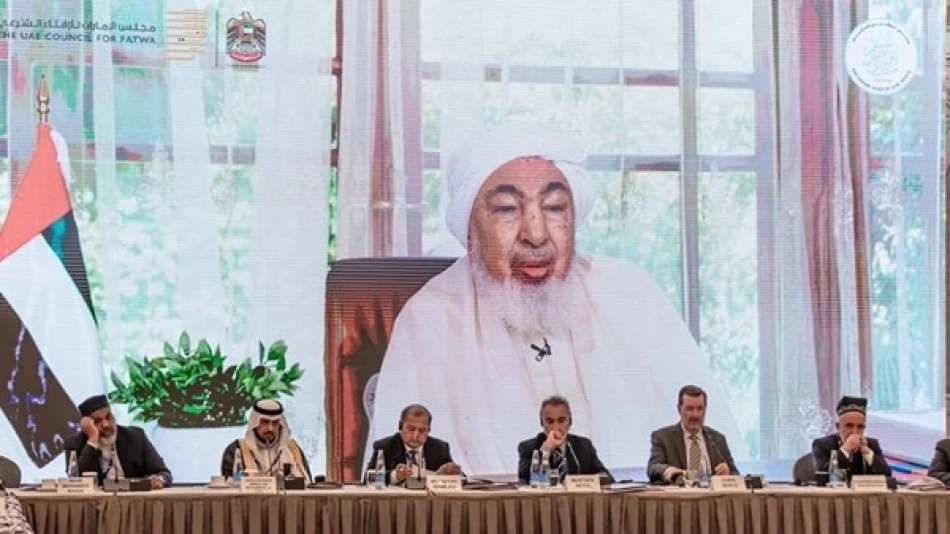
UAE's Peacebuilding Efforts Showcased at Document Dialogue Forum
UAE Religious Leader Calls for Global Peace Initiative as World Faces Mounting Conflicts
A prominent UAE Islamic scholar has issued an urgent appeal to the international community to halt wars and displacement, particularly highlighting the Gaza conflict, while presenting a comprehensive framework for global peace through interfaith dialogue and shared human values. The call comes as geopolitical tensions reach critical levels across multiple regions worldwide.
Strategic Timing Amid Global Turmoil
Sheikh Abdullah bin Bayyah, Chairman of the UAE Fatwa Council and President of the Abu Dhabi Peace Forum, delivered his message at the Second International Forum for Dialogue of Documents and Declarations in Uzbekistan. His intervention comes at a moment when traditional diplomatic channels appear strained, with conflicts spanning from the Middle East to Eastern Europe creating unprecedented humanitarian crises.
The scholar's emphasis on Gaza reflects the UAE's evolving diplomatic position, balancing its Abraham Accords commitments with growing regional pressure to address Palestinian concerns. This positioning demonstrates how Gulf states are navigating complex geopolitical realities while maintaining their peace-building credentials.
A Decade-Long Peace Architecture
Building Blocks of Interfaith Cooperation
Since 2014, the Abu Dhabi Peace Forum has systematically constructed an international framework for religious tolerance through landmark declarations. The Marrakech Declaration (2016) established principles for protecting religious minorities in Muslim-majority countries, while the New Alliance of Virtue Charter (2019) created interfaith partnerships for humanitarian action.
The Abu Dhabi Declaration on Inclusive Citizenship (2021) represents the most ambitious attempt yet to define citizenship beyond religious or ethnic boundaries. This progressive approach contrasts sharply with rising nationalism elsewhere, positioning the UAE as a unique model for pluralistic governance in an increasingly polarized world.
Market and Diplomatic Implications
These peace initiatives serve dual purposes: genuine humanitarian goals and strategic economic positioning. The UAE's reputation as a stable, tolerant hub attracts international investment and positions Dubai and Abu Dhabi as neutral venues for sensitive negotiations. This soft power approach has proven more durable than traditional military or economic leverage.
Uzbekistan Connection: Silk Road Diplomacy
The choice of Tashkent as venue carries significant symbolism. Uzbekistan's historical role as a center of Islamic scholarship and its current position as a bridge between Russia, China, and the West makes it an ideal neutral ground for such discussions. The country's own religious liberalization under President Shavkat Mirziyoyev parallels UAE efforts to promote moderate Islam.
This Central Asian connection also reflects broader UAE strategy to diversify diplomatic partnerships beyond traditional Western and Arab alliances, particularly as global trade routes shift and new economic corridors emerge.
Practical Framework for Global Action
Sheikh bin Bayyah's recommendations extend beyond symbolic gestures to concrete action items: immediate ceasefire calls, joint humanitarian initiatives, educational investment, protection of religious sites, and balanced approaches to free expression that respect religious sensitivities.
This framework addresses current flashpoints while building long-term institutional capacity for conflict prevention. The emphasis on education and protecting worship sites reflects lessons learned from recent conflicts where cultural destruction accompanied military action.
Testing Global Appetite for Peace
The initiative's success will largely depend on whether major powers view religious-based diplomacy as complementary to traditional statecraft or merely symbolic. Early indicators suggest growing interest, particularly among middle powers seeking alternatives to great power competition.
For investors and businesses operating in conflict-affected regions, these peace processes offer potential stability indicators worth monitoring. Companies increasingly factor social stability and interfaith harmony into long-term investment decisions, making such initiatives economically relevant beyond their humanitarian value.
Most Viewed News

 Layla Al Mansoori
Layla Al Mansoori






